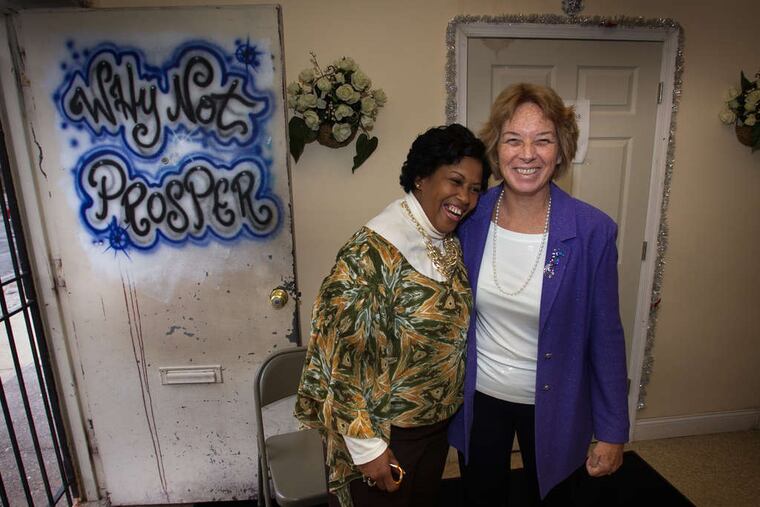New effort launched to break the cycle of prostitution
An Ivy League professor and her street-smart partner have launched a program to help former prostitutes stay off the streets for good.

MICHELLE Simmons started selling drugs at age 13, sneaking weed from her family's stash.
"I would take it to school and sell it for a dollar, so I could buy me some Now & Laters," the Germantown native said. "I went to jail in eighth grade."
Jail didn't stop her. By 18, she was driving up and down the East Coast transporting drugs. By her 20s, she was addicted to drugs and prostituting herself for as little as $5 a john to pay for her next high.
Once, in Los Angeles, she got arrested so often along one "ho stroll" street that cops banned her and vowed to arrest her on sight if she returned.
So Simmons, now 46, knows well how hard it can be to break the cycle of prostitution and drug addiction that keeps so many women bouncing endlessly between darkened street corners and jail cells.
Kathleen Brown knows, too, although for different reasons.
Brown is a professor at the University of Pennsylvania's School of Nursing who has dedicated her career to helping society's most vulnerable citizens, including prison inmates and sex-assault survivors. She created a program called Breaking the Cycle, based on the premise that prostitutes, given enough time and support, could leave the streets behind and not only survive but thrive.
Brown and Simmons met in June at a conference about helping ex-cons reintegrate into the community. Brown needed a partner to put her program in practice. Simmons runs transitional housing for female ex-offenders, her mission since she found God in prison.
In October, the pair launched Breaking the Cycle at Why Not Prosper?, transitional housing that Simmons has run in Germantown since 2006. Six former prostitutes now participate, with room for up to 23. With sustained sobriety their initial goal, residents spend a year sorting out their health, housing, legal, educational, career and other needs.
It's not the first program in Philadelphia committed to helping sexually exploited women recover. Dawn's Place, run by a team of faith-based missionaries, academics, social workers and anti-trafficking advocates, opened a residential shelter in 2009. It houses up to nine women and also seeks a yearlong commitment, said Sister Eileen White, the resident coordinator there.
But Breaking the Cycle is a bit different: Reformed ex-prostitutes and ex-addicts run the day-to-day operation of the home. Brown, meanwhile, brings in colleagues and students from the Wharton School and Penn's psychology and nursing programs to counsel and treat residents. There's even a Penn sorority, Alpha Delta Pi, whose members have volunteered to visit the ex-prostitutes weekly to teach knitting, play board games and otherwise socialize.
And Breaking the Cycle has a well-known philanthropic fan. Doris Buffett, billionaire Warren Buffett's sister, has agreed to pay the participants' $400 monthly rent, through her Sunshine Lady Foundation.
That's a relief, because money is always a headache, Simmons said. She draws no salary and has no full-time paid staff. She funds Why Not Prosper? through foundations, fundraising and resident fees (residents not enrolled in Breaking the Cycle have to pay their own rent).
She and Brown have asked the Philadelphia Prison System for a $214,000 annual grant, which will allow them to hire a full-time manager, social worker, house monitor, case manager and secretary.
Commissioner Louis Giorla toured Why Not Prosper? earlier this fall. Prisons spokeswoman Shawn Hawes said trustees haven't decided whether to approve the funding request. Re-entry programs for ex-offenders have been an oft-repeated priority for Mayor Nutter.
Even though Simmons pulls no paycheck, she is devoted wholeheartedly to Why Not Prosper?, which she sees as her ministry.
Clean for 15 years, Simmons quit tricking in 2000 and went to the New Life Bible Institute in Norristown to become a minister. She opened her first transitional housing for ex-offenders in 2003 in a cottage owned by a Presbyterian church in Norristown, with room for just three women.
She moved Why Not Prosper? to Germantown in 2006, buying an old church on Chelten Avenue near Chew. She's expanded steadily since then, buying a home around the corner in 2011 and renting and renovating another next door in 2013.
At all three sites, she made the bedrooms and common areas as homey as possible, so her residents don't feel as if they're still incarcerated.
But it's Simmons herself who's the real draw for many participants.
"You can go many places and meet many people and see many things, and I have, but when you find a person who can truly understand you and not look at you any different - that's what matters," said Kimberly Jones, 43, a South Philadelphia native who fell into drug addiction at 16 and has prostituted on and off for 11 years.
Of Simmons, she said: "She has faith and belief in me. She's a vision of hope for me. I want to be a vision of hope for someone else."
Since going straight, Simmons has gotten her bachelor's and master's degrees (and is now working on a doctorate) in human services, counseling and psychology, so that she can more directly help her charges.
That connection is key, she says, because Why Not Prosper? is not a court-ordered or locked facility. That means she sometimes loses residents back to the streets.
"I can't physically keep them in," Simmons said. "But mentally, I keep them in. Emotionally, I keep them in. If they feel like just one person cares about them, they will stay here."